- Home
- Elizabeth George
This Body of Death Page 23
This Body of Death Read online
Page 23
“Dead? What happened? When did she die?”
“Few days ago. In Abney—”
His eyes widened. “She’s the woman in the cemetery? I saw it in the papers but there’s been no name.”
“Won’t be till we find her family,” Nkata said.
“Well, I can’t help you with that. I don’t know who they are.” He looked away from them, in the direction of the ice rink where a pileup had occurred at the far end. Instructors were hurrying over to assist. “God, but that’s bad, isn’t it?” He looked back to them. “Murdered in a cemetery.”
“It is,” Barbara said.
“C’n you tell me how … ?”
Sorry. They could not. Regulations, police work, the rules of investigation. They’d come to the ice rink to gather information about Jemima. How long had he known her? How well did he know her? How did they meet?
Abbott thought about this. “Valentine’s Day. I remember because she brought balloons in for Frazer.” He watched Nkata writing in his notebook and added, “He’s the bloke who hands out the rental skates. Over by the lockers. Frazer Chaplin. I thought at first that she was a delivery girl. You know? Making a delivery of Valentine balloons from Frazer’s girlfriend? But turned out she was the new girlfriend—or at least she was trying to be—and she’d dropped in to surprise him. We got introduced and we chatted a bit. She was quite keen on having lessons, so we made arrangements to meet. We had to work around her schedule, but that wasn’t difficult. Well, I was happy to accommodate, wasn’t I? I’ve got three ex-wives with four children among them, so I don’t turn away paying customers.”
“You would have, otherwise?” Barbara asked.
“Turned her away? No, no. Well, I mean I might have done ultimately if my own circumstances had been different—what with the wives and the kids—but as she showed up regularly and right on time and as she always paid, I couldn’t really quibble if her mind seemed on other things when she was here, could I?”
“What sorts of things? Do you know?”
He looked like a man about to say that he hated to speak ill of the dead, but then he eschewed that comment for, “I expect it had to do with Frazer. I think the lessons were really an excuse to be near him, and that’s why she couldn’t actually keep her mind on what she was doing. See, Frazer’s got something that attracts the ladies, and when they’re attracted, he doesn’t exactly fight them off, if you know what I mean.”
“We don’t, as it happens,” Barbara said. A lie, naturally, but they needed as many details as they could amass at this point.
“He makes the odd arrangement?” Abbott said delicately. “Now and then? Don’t misunderstand, it’s always on the up-and-up as far as the ladies’ ages go: no underage girls or anything. They turn in their skates and have a word with him, they slip him a card or a note or something, and …well, you know. He goes off for a bit with one or the other. Sometimes he phones in late to his night employment—he’s a bartender at some posh hotel—and he takes a few hours with one of them. He’s not a bad bloke, mind you. It’s just how he is.”
“And Jemima had an idea this was going on?”
“A suspicion. Women aren’t stupid, are they. But the trouble for Jemima was that Frazer’s here for the earliest shift and she could only come in the evening or on her own days off work. So that leaves him free to be more or less available to ladies who want to flirt or to ladies who want more.”
“What was your own relationship with Jemima?” Barbara asked, for she realised that Yolanda’s mutterings—as much as she wanted to discount them—could well apply to this man with his helmet of black hair, “dark as the night.”
“Mine?” he asked, fingertips to his chest. “Oh, I never get involved with my skating students. That would be unethical. And anyway, I’ve three ex-wives and—”
“Four kids, yes,” Barbara said. “But I expect a poke on the side wouldn’t go amiss. If one was on offer and there were no strings.”
The ice skater flushed. “I won’t say I didn’t notice she was attractive. She was,” he said. “Unconventional, you know, with those eyes of hers. Bit on the small side, not much meat on her. But she had a real friendliness about her, not like the typical Londoner. I suspect a bloke could have taken that wrong if he wanted to.”
“You didn’t, however?”
“As three times were not the charm for me, I wasn’t about to go for a fourth. I’ve not had luck in marriage. Celibacy, I find, keeps me safe from involvement.”
“But groundwork laid, you could have had her, I expect,” Barbara pointed out. “After all, a poke isn’t marriage these days.”
“Groundwork or not, I wouldn’t have tried it. A poke may not lead to marriage these days, but I had the feeling that wasn’t the case for Jemima.”
“Are you saying she was after this Frazer for marriage?”
“I’m saying she wanted marriage, full stop. I got the impression it could have been Frazer, but it could have been anyone else as well.”
THE TIME OF day was such that Frazer Chaplin was no longer at the Queen’s Ice and Bowl, but this was not a problem. The name was an unusual one, and Barbara reckoned there couldn’t be two Frazer Chaplins running round town. This had to be the same bloke who lived in Bella McHaggis’s house, Barbara informed Nkata. They needed a word with him.
On their way across town, she put Winston in the picture with regard to Bella McHaggis’s rules about fraternisation among her lodgers. If Jemima Hastings and Frazer Chaplin had been involved, their landlady either had not known it or had turned a blind eye for reasons of her own, which Barbara seriously doubted.
In Putney, they found Bella McHaggis just entering her property with a shopping trolley half filled with newspapers. As Nkata parked the car, Mrs. McHaggis began unloading this trolley into one of the large plastic bins in her front garden. She was doing her bit for the environment, she informed them when they came through the gate. Bloody neighbours wouldn’t recycle a damn thing if she didn’t make an issue of it.
Barbara made an appropriate murmur of sympathy and then asked was Frazer Chaplin at home. “This is DS Nkata,” she added by way of introduction.
“What d’you lot want with Frazer?” Bella said. “It’s Paolo you ought to be talking to. What I found I found in his cupboard, not Frazer’s.”
“Beg your pardon?” Barbara asked. “Look, could we go inside, Mrs. McHaggis?”
“When I’m finished here,” Bella said. “Some things are important to some people, miss.”
Barbara had an inclination to tell the woman that murder was definitely one of those things, but instead she rolled her eyes at Nkata as Bella McHaggis went back to unloading her trolley of newspapers. When she’d accomplished this, she told them to follow her inside, and they’d not made it farther than the entry—with its lists of rules and its signs about the landlady’s presence on the property—when Bella gave them an earful about her evidence and demanded to know why they hadn’t dispatched someone at once to collect it.
“I rang that number, I did. The one in the Daily Mail asking for information. Well, I’ve got information, don’t I, and you’d think they’d come by and ask one or two of their questions about it. And you’d think they’d come on the run.”
She led them into the dining room, where the number of broadsheets and tabloids she had spread on the table suggested she was closely following the progress of the investigation. She said they were meant to sit there while she fetched what they wanted, and when Barbara pointed out that what they wanted was a word with Frazer Chaplin if he was at home, she said, “Oh, don’t be such a ninny. He’s a man but he isn’t a fool, Sergeant. And have you done anything about that psychic? I rang the police about her as well. Hanging about outside my property again. There she was, large as life.”
“We’ve had a word with Yolanda,” Barbara said.
“Thank God for small mercies.” Bella seemed about to relent on the matter of Frazer Chaplin but then her face altered as she mad
e the mental leap from what Barbara had just said to what Barbara and Winston Nkata wanted, a word with Frazer. She said, “Why, that mad bloody cow. She’s said something about Frazer, hasn’t she? She’s told you something that’s brought you here on the run and you mean to arrest him. Well, I’m not having that. Not with Paolo and his five engagements and his bringing Jemima here as a lodger and that argument of theirs. Just a friend, he tells me and she agrees and then look what happens.”
“Let me clarify that Yolanda said nothing about Frazer Chaplin,” Barbara said. “We’re coming at him from another angle. So if you’d fetch him … ? Because if he isn’t here—”
“What other angle? There is no other angle. Oh, you wait right there and I’ll prove it to you.”
She marched out of the dining room. They heard her go up the stairs. When she was gone, Winston looked at Barbara. “Felt like I ought to salute or summick.”
“She’s quite the character,” Barbara admitted. Then, “Do you hear water running? Could Frazer be having a shower? His room’s below us. The basement flat. She doesn’t seem to want us to see him, does she?”
“Protecting him? Think she fancies him?”
“It fits with what Abbott Langer said about Frazer and the ladies, eh?”
Bella returned to them, a white envelope in her hand. With the triumphant air of a woman who’d out-Sherlocked the best of them, she told them to have a look at that. That turned out to be a thin spatulate finger of plastic with a slip of paper emerging from one end of it and a ridged area at the other. In the middle were two small windows, one round and one square. The centre of each of these was coloured with a thin blue line, one horizontal and one vertical. Barbara had never seen one before—she’d hardly been in a position of need when it came to such things—but she knew what she was looking at and so, apparently, did Winston.
“A pregnancy test,” Bella announced. “And it wasn’t among Jemima’s belongings, was it? It was in Paolo’s clobber. Paolo’s. Well, I daresay Paolo’s not testing himself, is he?”
“Not likely,” Barbara agreed. “But how do you reckon this’s Jemima’s? I assume that’s what you’re thinking, eh?”
“It’s obvious. They shared the bathroom and the toilet’s in the bathroom. She either gave this to him”—with a jerk of her head towards the slip of paper—“or, what’s more likely, he saw it in the rubbish and fished it out, and that explains their quarrel. Oh, he said it was due to a misunderstanding about Jemima’s hanging her smalls in the bath and she said it had to do with that male/female nonsense about leaving the toilet seat up, but let me tell you I had a feeling about them from the first. They were butter wouldn’t melt and all the rest of it, friends from the workplace in Covent Garden. I happened to have a vacant room and he happened to know of someone who was looking and could he bring her, Mrs. McHaggis? She seems a nice enough sort of girl, he says. And there I was, ready to believe the two of them while all the time they’re sneaking round on the floor below me, going at it like monkeys behind my back. Well, let me tell you right now, if she wasn’t dead, she’d be gone. Out. Finished. On her ear. On the pavement.”
Right where Yolanda wanted her, Barbara concluded. All well and good, but Yolanda would hardly have sneaked into the house and planted a pregnancy test in the bathroom on the slight chance that Bella McHaggis would find it, jump to conclusions, and evict the one lodger Yolanda wanted to get her mitts on. Or would she?
Barbara said, “We’ll take this into consideration.”
“You damn well bloody will,” Bella said. “It’s motive loud and clear and make no mistake. Big as life. Right before your eyes.” She leaned across the table, her palm flat on the front of the Daily Express. “He’s been engaged five times, mind you. Five times and what does that say about him? Well, I’ll tell you what it says. It says desperate. And desperate means a man who’ll stop at nothing.”
“And you’re talking about … ?”
“Paolo di Fazio. Who else?”
Anyone else, Barbara reckoned, and she could see Winston was thinking the same. She said, Right yes, they would have a word with Paolo di Fazio.
“I should certainly hope you will. He’s got himself a lockup somewhere, a place where he does his sculpting. You ask me, he dragged that poor girl into that place and did his worst and dumped her body …”
Yes, yes, whatever. All of this would be checked out, Barbara assured her, nodding towards Winston to indicate that he’d been scrupulously taking notes. They’d be having a word with all of the lodgers, and that did include Paolo di Fazio. Now as to Frazer Chaplin—
“Why do you want to make this about Frazer?” Bella demanded.
Precisely because you don’t, Barbara thought. She said, “It’s a matter of putting a full stop to every possibility. It’s what we do.” It was part and parcel of the job. Trace, interview, and eliminate.
As Barbara was speaking, the door leading down to the basement flat opened and shut and a man’s pleasant voice called, “I’m off then, Mrs. McH.”
Winston got to his feet. He went out into the corridor that led towards the back of the house and said, “Mr. Chaplin? DS Winston Nkata. We’d like a word please.”
A moment. And then, “Sh’ll I ring Duke’s and let them know? I’m expected at work in thirty minutes.”
“Won’t take long, this,” Nkata told him.
Frazer followed Winston into the room, which gave Barbara her first close look at the man. Dark as the night. Yet another, she thought. Not that she intended to give credence to Yolanda’s ravings. But still …He was a stone and he couldn’t be left unturned.
He looked round thirty years old. His olive skin was pock-marked but that didn’t detract, and while his shadowy stubble could have covered the scars if he’d grown them into a beard, he was wise not to have done so. He looked piratical and a little dangerous, which, Barbara knew, some women found attractive.
He locked eyes with her, then gave her a nod. He was carrying a pair of shoes, and he sat at the table and put these shoes on, lacing them up and saying no thanks to Bella McHaggis’s offer of tea. It was an offer that, pointedly, she did not make to the other two. Her attention to the man—she called him luv—in addition to what Abbott Langer had told them about his effect on women made Barbara want to suspect him on the spot. Which wasn’t exactly good police work, but she had an automatic aversion to men like this bloke because he had one of those unmistakable I-know-what-you-want-and-I’ve-got-it-here-in-my-trousers expressions on his face. No matter the difference in their ages, if he was giving it to Bella on the side, no wonder she was besotted.
And she was. That much was clear, far beyond the luv and the darling. Bella looked upon Frazer with a fond expression that Barbara might have considered maternal had she not been a cop who’d seen just about every permutation of human entanglement in her years on the force.
“Mrs. McH has told me about Jemima,” Frazer said, “that she’s the one from the cemetery. You’ll be wanting to know what I know and I’m glad to tell you. I expect Paolo will feel likewise, as will everyone who knew her. She’s a lovely girl.”
“Was,” Barbara said. “As she’s dead.”
“Sorry. Was.” He looked something between bland and solemn, and Barbara wondered if he felt anything at all for the fact that his fellow lodger had been murdered. Somehow, she doubted it.
“We understand she had a bit of a thing for you,” Barbara said. Winston did his part with the notebook and pencil, but he was watching Frazer’s every move. “Balloons at Valentine’s Day and all the et ceteras?”
“What would those et ceteras be? Because as I see it, sure there’s no crime in an innocent delivery of six balloons.”
Bella McHaggis’s eyes narrowed at this mention of balloons. Her glance went from the police to her lodger. He said, “Not to worry, Mrs. McH. I said I’d not be making the same mistake twice, and you’ve got my word on it that I didn’t.”
“What mistake would that be?” Barbara
asked.
He moved to get more comfortable in his seat. He had a wide-legged posture when sitting, Barbara noted, one of those blokes who liked to show off the family jewels. “I had a bit of a fling at one time with a lass who lived here,” he said. “It was wrong, and I know it, and I did my penance. Mrs. McH didn’t toss me out on my ear as she otherwise might have done, for which I’m grateful. So I wasn’t likely to go the wayward-son route again.”
Considering what they’d heard from Abbott Langer—if he’d been speaking the truth—Barbara had her doubts about Frazer’s sincerity in this matter. She said to him, “I understand you work at more than one job, Mr. Chaplin. Could you tell me where else you’re employed besides the ice rink?”
“Why?” Bella McHaggis was the one to ask the question. “What’s that got to do with—”
“It’s just procedure,” Barbara told her.
“What sort of procedure?” Bella demanded.
“It’s nothing, Mrs. McH,” Frazer said. “They’re just doing their jobs.” Frazer said that he worked late afternoons and evenings in Duke’s Hotel in St. James’s. He was the bartender there and had been for the last three years.
“Industrious,” Barbara noted. “Two jobs.”
“I’m saving,” he said. “It’s not a crime, I believe.”
“Saving for what?”
“How’s that important?” Bella demanded. “See here—”
“Everything’s important till we know it’s not,” Barbara told her. “Mr. Chaplin?”
“Emigration,” he said.
“To … ?”
“Auckland.”
“Why?”
“I’ve hopes to open a small hotel. A lovely little boutique hotel, as it happens.”
“Anyone helping you save?”
He frowned. “What d’you mean?”
“Young lady, p’rhaps, contributing to your hotel fund, making plans, thinking she’ll be included?”
“You’re speaking of Jemima, I expect.”
“Why would you jump to that conclusion?”

 Well-Schooled in Murder
Well-Schooled in Murder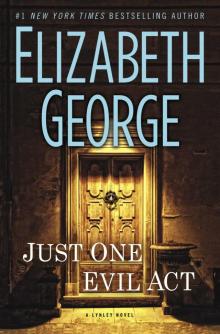 Just One Evil Act
Just One Evil Act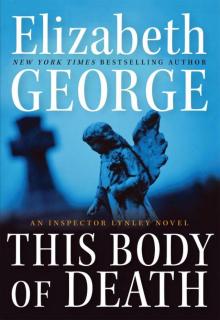 This Body of Death
This Body of Death The Edge of the Water
The Edge of the Water For the Sake of Elena
For the Sake of Elena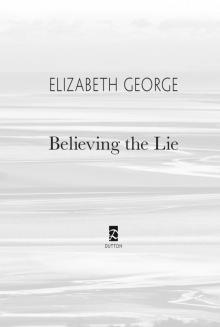 Believing the Lie
Believing the Lie The Edge of the Shadows
The Edge of the Shadows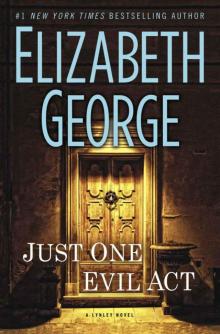 Just One Evil Act: A Lynley Novel
Just One Evil Act: A Lynley Novel In Pursuit of the Proper Sinner
In Pursuit of the Proper Sinner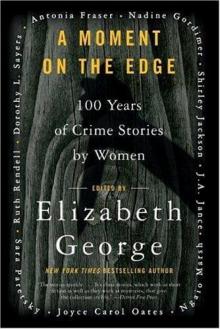 A Moment on the Edge:100 Years of Crime Stories by women
A Moment on the Edge:100 Years of Crime Stories by women Elizabeth I
Elizabeth I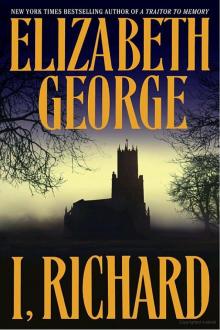 I, Richard
I, Richard A Traitor to Memory
A Traitor to Memory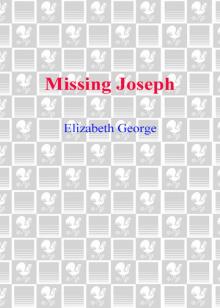 Missing Joseph
Missing Joseph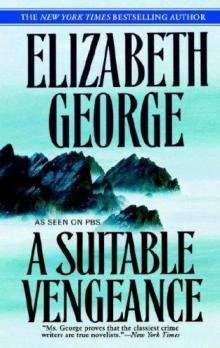 A Suitable Vengeance
A Suitable Vengeance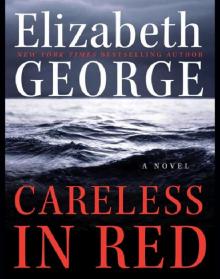 Careless in Red
Careless in Red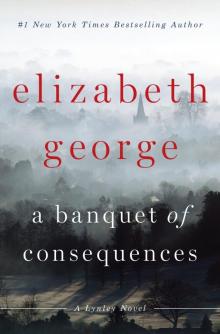 A Banquet of Consequences
A Banquet of Consequences Playing for the Ashes
Playing for the Ashes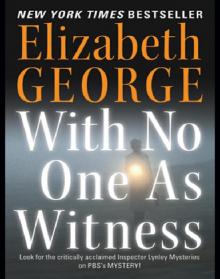 With No One As Witness
With No One As Witness Deception on His Mind
Deception on His Mind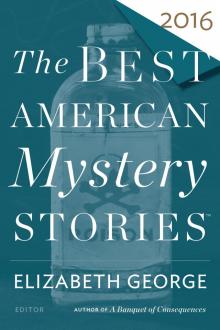 The Best American Mystery Stories 2016
The Best American Mystery Stories 2016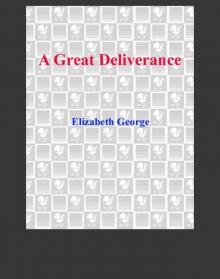 A Great Deliverance
A Great Deliverance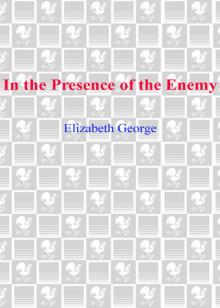 In the Presence of the Enemy
In the Presence of the Enemy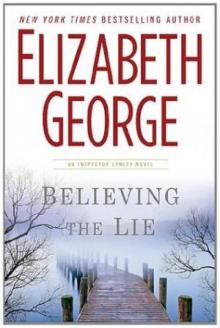 Believing the Lie il-17
Believing the Lie il-17 The Edge of the Light
The Edge of the Light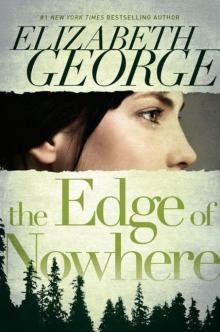 SW01 - The Edge of Nowhere
SW01 - The Edge of Nowhere A Place of Hiding
A Place of Hiding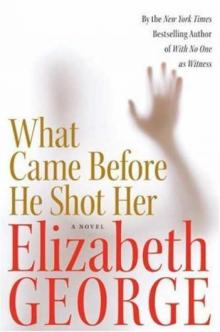 What Came Before He Shot Her il-14
What Came Before He Shot Her il-14 Payment In Blood
Payment In Blood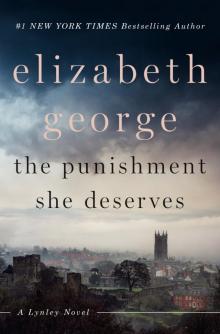 The Punishment She Deserves
The Punishment She Deserves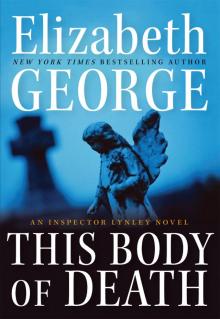 This Body of Death: An Inspector Lynley Novel
This Body of Death: An Inspector Lynley Novel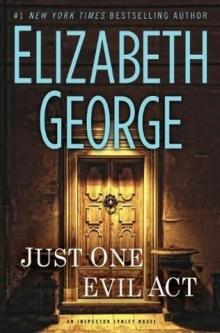 Just One Evil Act il-18
Just One Evil Act il-18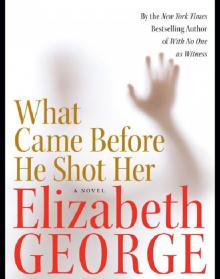 What Came Before He Shot Her
What Came Before He Shot Her Missing Joseph il-6
Missing Joseph il-6